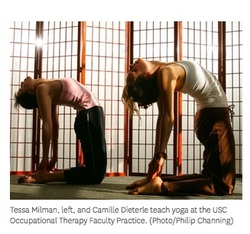
California is often on the cutting edge of trends. Since the early 1990s, though, other states and many countries have taken the lead in adopting integrative medicine, an approach involving herbs, music, nutrition, relaxation and other non-Western healing techniques.
In 2012, USC joined a U.S. consortium of 60 major U.S. medical centers that includes Harvard, the University of Arizona and Stanford. On April 16, the USC Institute for Integrative Health will hold its first conference.
“Some of the things that people are calling alternative medicine have been around for thousands of years,” said Dr. Marc Weigensberg. “What’s new is how we are using scientific methods to assess the effectiveness of these treatments.”
Weigensberg teaches Clinical Pediatrics in the USC Keck School of Medicine and directs Pediatric Endocrinology at the L.A. County-USC Medical Center. He trained as a pediatric endocrinologist at the University of Chicago’s Pritzker School of Medicine, where he received his medical degree.
“I found that wasn’t enough,” he said. “Western methods are really only a percentage of what we need to effectively treat diabetes. The challenge isn’t to learn how to administer insulin, but how to integrate mind-body medicine in our lives for good health.”
Weigensberg’s specialty is guided imagery, a process that includes meditation, breathing and relaxing thoughts to reduce stress.
“Thinking about relaxing on the beach has virtually the same relaxing effect as relaxing at the beach,” he said. “When you do this exercise, your stress hormone level is reduced by about 40 percent over 45 minutes to an hour.”
Weigensberg is also a clinical investigator in the USC Childhood Obesity Research Center, and is halfway through a 5-year National Institute of Health study into how exercise and other integrative health elements affect high school students’ wellness.
The April 16 conference will feature keynote speeches “The Art and Science of Vitality,” by Dr. Victoria Maizes and “Finding Your Rhythm: The Science and Practice of Music and Sound Healing” by Tobi Fishel.
Maizes is Executive Director of the University of Arizona’s Center for Integrative Medicine and teaches medicine, family medicine and public health at the school’s College of Medicine. She developed a primary care clinical model and research tools to measure health, wellbeing and how our surroundings affect our health.
Maizes also edits the Oxford University textbook “Women’s Integrative Health” and is the author of “Be Fruitful: The Essential Guide to Maximizing Fertility and Giving Birth to a Healthy Child.”
Fishel co-founded and led the Vanderbilt Medical School’s Osher Center for Integrative Medicine. She has worked for more than 25 years with distressed physicians, as well as children, teens, and adults suffering with chronic illness and pain, and other traumas.
Fishel directs a training program for therapists in the areas of adult and pediatric diabetes, and facilitates a 6-month intensive course for distressed physicians that incorporates creativity, compassion, meditation, music, art, narrative therapy, play, spirituality, and the healing aspects of nature.
by Steve Weingarten – Since 1999, Weingarten has consulted with a mix of corporate, legal, nonprofit and labor clients. He developed a public outreach campaign for United Teachers Los Angeles that reached deep into communities served by the L.A. Unified School District, created a scholarship program for one of California’s leading investment banking firms, and put union communications for the bus drivers and mechanics of Greyhound, one of America’s corporate icons, online. Steve’s creativity, imagination, and energy were instrumental in routing an all-out management campaign to take back teacher rights, and winning the highest single-year increase in L.A. teacher salaries.
*****
USC staff, faculty and students, as well as the greater USC community and general public are welcome to attend the inaugural conference on integrative health and medicine. CLICK HERE TO REGISTER